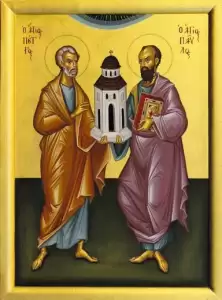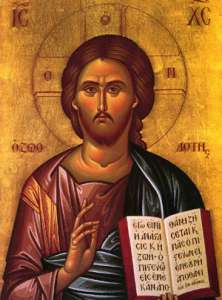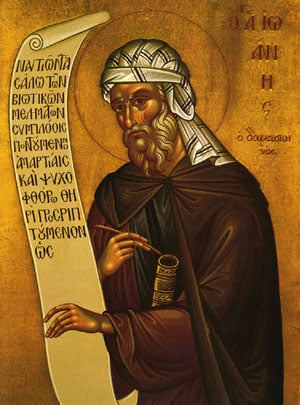Warning: Undefined array key "margin_above" in /home/stscahvallejo/public_html/wp-content/plugins/ultimate-social-media-icons/libs/controllers/sfsiocns_OnPosts.php on line 652
Warning: Undefined array key "margin_below" in /home/stscahvallejo/public_html/wp-content/plugins/ultimate-social-media-icons/libs/controllers/sfsiocns_OnPosts.php on line 653
In proportion to your humility you are given patience in your woes; and in proportion to your patience the burden of your afflictions is made lighter and you will find consolation; in proportion to your consolation, your love of God increases; and in proportion to your love, your joy in the Holy Spirit is magnified. Once men have truly become His sons, our tenderly compassionate Father does not take away their temptations from them when it is His pleasure to 'make for them a way to escape' (1 Cor. 10:13), but instead He gives His sons patience in their trials. All these good things are given into the hand of their patience for the perfecting of their souls.”
St. Isaac of Nineveh
For Sunday, December 4
 Epistle Reading
Epistle Reading
The reading is from St. Paul's Letter to the Galatians 3:23-29; 4:1-5
Brethren, before faith came, we were confined under the law, kept under restraint until faith should be revealed. So that the law was our custodian until Christ came, that we might be justified by faith. But now that faith has come, we are no longer under a custodian; for in Christ Jesus you are all sons of God, through faith. For as many of you as were baptized into Christ have put on Christ. There is neither Jew nor Greek, there is neither slave nor free, there is neither male nor female; for you are all one in Christ Jesus. And if you are Christ's, then you are Abraham's offspring, heirs according to promise. I mean that the heir, as long as he is a child, is no better than a slave, though he is the owner of all the estate; but he is under guardians and trustees until the date set by the father. So with us; when we were children, we were slaves to the elemental spirits of the universe. But when the time had fully come, God sent forth his Son, born of a woman, born under the law, to redeem those who were under the law, so that we might receive adoption as sons.
Do you see yourself as a son or daughter of God?
In this epistle reading from St. Paul's letter to the Galatians, he tells us that we are sons of God! Do you think of yourself as a son or daughter of God? Perhaps in our humility or sense of unworthiness or feelings of shame and guilt due to sins, a person may not feel ready or comfortable to call or see himself as a son of God or a daughter of God. But therein lies a subtle deception of our common enemy the Devil. Because the moment you recognize that you truly are a son of God or a daughter of God then you will also be inspired to live up to this identity in your thoughts, words, deeds, behavior and appearance. But as long as the devil can keep this realization from you, it will also be easy to avoid claiming this divine identity as your own. So let us believe what St. Paul is telling us because it is the truth. In this world, there are many other labels and identities that we claim. It could be our ethnicity, our political affiliation, our economic status, our careers, our educational level. etc. Yet none could ever capture or encapsulate who we have become by being joined to Jesus Christ in His Church: the sons and daughters of God. So let us think of ourselves first as sons and daughters of the living God and consider all other labels and identities as secondary and temporary for this life. Because as St. Paul says, "there is neither Jew nor Greek, there is neither slave nor free, there is neither male nor female; for you are all one in Christ Jesus." The labels that we assume in this world can create create separation. Through Christ we transcend them and live in a new way and with a new understanding that the world can never understand. Through Christ we have true equality and our human nature achieves true progress because it is able to achieve theosis - becoming and being sons and daughters of God.
Questions:
- Do you see yourself as a son or daughter of God? If not, why not?
- Which prayer that we say all the time can help remind us who we are? What else can that famous prayer teach us about how to behave as children of God?
 Gospel Reading
Gospel Reading
The Gospel According to Luke 13:10-1
At that time, Jesus was teaching in one of the synagogues on the sabbath. And there was a woman who had a spirit of infirmity for eighteen years; she was bent over and could not fully straighten herself. And when Jesus saw her, he called her and said to her, "Woman, you are freed from your infirmity." And he laid his hands upon her, and immediately she was made straight, and she praised God. But the ruler of the synagogue, indignant because Jesus had healed on the sabbath, said to the people, "There are six days on which work ought to be done; come on those days and be healed, and not on the sabbath day." Then the Lord answered him, "You hypocrites! Does not each of you on the sabbath untie his ox or his donkey from the manger, and lead it away to water it? And ought not this woman, a daughter of Abraham whom Satan bound for eighteen years, be loosed from this bond on the sabbath day?" As he said this, all his adversaries were put to shame; and all the people rejoiced at all the glorious things that were done by him.
Keeping the Sabbath holy
The Pharisees were blinded so much by their legalistic approach to the law of Moses that they failed to realize that one greater than Moses was among them performing miracles that only God could do. They condemned Christ for healing on the Sabbath, not realizing that he is the Lord of the Sabbath. For us Christians, the new Sabbath is Sunday because that is the day of Christ's resurrection. We must keep it holy. It is a serious sin to not attend worship on Sunday for no good reason or to ignore this holy day and spend it indulging in worldly amusements and secular concerns. It is a day that must be reserved for worship and contemplation and thanksgiving to God. In this way, we honor not the day but the One who created all time and all days and gave us life to experience and know Him every day!
In fact, we should also consider Sunday the first day of our week and not the end of the weekend. We can start our week with God on Sunday, asking him to help us, strengthen us and guide us in all things during the week ahead. The "rest" that we observe on Sundays should not preclude doing good works. The true "rest" is to have freedom from all earthly things and set our minds of the divine things of the next life and the heavenly kingdom.
Questions:
- Why does the Lord call the Pharisees hypocrites?
- Sometimes we may go to church on Sunday but then fail to keep the spirit of holiness the rest of the day and the rest of the week. Does that make us hypocrites as well? How can we avoid that?
 The Life of St. John of Damascus
The Life of St. John of Damascus
Saint John was born in Damascus, Syria about the year 675, the son of wealthy and pious parents, of the family of Mansur. He was reared together with Saint Cosmas (see Oct. 14), who had been adopted by John's father Sergius, a man of high rank in the service of the Caliph of Damascus. Both of these young men were instructed by a certain monk, also named Cosmas, who had been taken captive in Italy by the Arabs and later ransomed by John's Father. Saint John became a great philosopher and enlightener of the age in which he lived, and was honoured by the Caliph with the dignity of counsellor.
When Emperor Leo the Isaurian (reigned 717-741) began his war on the holy icons, John wrote epistles defending their veneration. Since the Saint, being under the Caliph of Damascus, was beyond Leo's power, the Iconoclast Emperor had a letter forged in John's handwriting which invited Leo to attack Damascus, saying the city guard was then weak; Leo then sent this letter to the Caliph, who in his fury punished John's supposed treason with the severing of his right hand. The Saint obtained the Caliph's Permission to have his severed hand again, and that night prayed fervently to the most holy Theotokos before her icon. She appeared to him in a dream and healed his hand, which, when he awoke, he found to be healed in truth. This Miracle convinced the Caliph of his innocence, and he restored John to his office as counsellor. The Saint, however, with many pleadings obtained his permission to withdraw from the world to become a monk. He assumed the monastic habit in the Monastery of Saint Sabbas. Then he had as elder a very simple and austere monk who commanded him neither to write to anyone, nor to speak of the worldly knowledge he had acquired, and John faithfully obeyed. A monk grieving over his brother's death, however, after insisting vehemently, prevailed upon John to write a funeral hymn to console him for his brother's death. When John's elder learned of his transgression of the rule he had given him, he cast him out of his cell, and would only accept him back after John had humbly, with much self-condemnation and without murmuring consented to clean all the latrines in the lavra. After his elder had received him back, our Lady appeared to the elder and sternly charged him not to hinder John any longer from his writings and composition of hymns.
In his writings he fought courageously against the Iconoclasts Leo the Isaurian and his son Constantine Copronymus. He was also the first to write a refutation of Islam. The time he had spent as a counsellor in the courts of the Moslems of Damascus had given him opportunity to learn their teachings at first hand, and he wrote against their errors with a sound understanding of their essence. Saint John was surnamed Chrysorroas ("Golden-stream") because of the eloquence of his rhetorical style and the great abundance of his writings; this name - Chrysorroas was also the name of the river that flows by Damascus. In his writings he set forth the Orthodox Faith with exactness and order. In his old age, after his foster-brother Cosmas had been made Bishop of Maiuma, John also was ordained presbyter by the Patriarch of Jerusalem. Having lived eighty-four years, he reposed in peace in 760. In addition to his theological writings, he adorned the Church of Christ with metrical and prose hymns and composed many of the prosomia used as the models for the melodies of the Church's liturgical chant; he also composed many of the sacred hymns for the feasts of the Lord Saviour and the Theotokos. The life of Saint John of Damascus was written by John, Patriarch of Jerusalem.
St. John of Damascus' teaching on Icons
The renowned Church Father, St. John of Damascus offered a precise and theologically lucid defense of the veneration of icons against those who wanted to remove them from the life of the Church. St. John wrote:
“God says, ‘You shall not have any gods other than me. You shall not make yourself a graven image, or any likeness. You shall not worship them or serve them, for I am the Lord thy God.’ [Deut. 5.7-9] You see that he forbids image-making to avoid idolatry, and because it is impossible to make an image of the immeasurable, invisible God. As St Paul said at the Areopagus, “As we are the offspring of God, we must not imagine God to be like gold, silver, stone, or anything created by humans.” [Acts 17.29] But these instructions were given to the Hebrews because they were prone to idolatry. We, on the other hand, are no longer tied to apron strings. We have outgrown superstitious error, and know God in truth, worshiping him alone, enjoying the fullness of his knowledge. We are no longer children but adults. We receive our habit of mind from God, and know what may be depicted and what may not. The Scripture says, “You have not seen his face.” [Ex. 33.20] How wise the Law is! How could one depict the invisible? How can one picture the inconceivable? How could one express the limitless, the immeasurable, the invisible? How can one give infinity a shape? How can one paint immortality? How can we put mystery in one place? But when you think of God, who is a pure spirit, becoming man for your sake, then you can clothe him in a human form. When the invisible becomes visible to the eye, you may then draw his form. When he who is a pure spirit, immeasurable in the boundlessness of his own nature, existing as God, takes on the form of a servant and a body of flesh, then you may draw his likeness, and show it to anyone who is willing to contemplate it. Worship is one thing, veneration another. The invisible things of God have been made visible through images since the creation of the world.
Thank you for participating in SOFIA! If you've subscribed to our newsletter, look for an email notification next week when a new lesson page is posted. See you Sunday!

 Weekly catechism and spiritual devotion for the Orthodox home
Weekly catechism and spiritual devotion for the Orthodox home